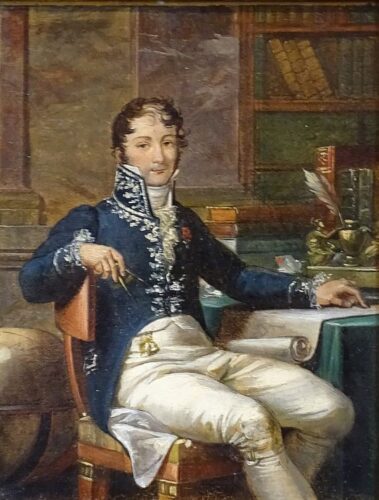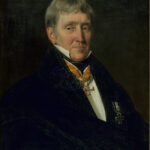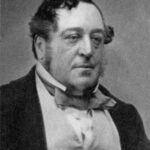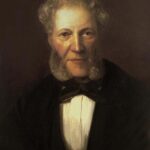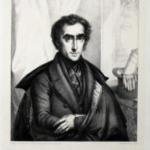This is the story of Baron de Trémont, a French diplomat in Vienna, who approached Beethoven and against all odds managed to tame the bear.
Who was Baron de Trémont?
Louis-Philippe-Joseph Girod de Vienney, Baron de Trémont (born 2 October 1799, died 1 July, 1852) was a French officer and diplomat. For us, more importantly he was a musical enthusiast and supporter (maecenas) of artists. He held musical reunions at his home for fifty years allowing talents, both French and foreign, to display their talents.
He was made Baron of the French Empire in 1810 in recognition of his work for the Council of State. He was the founder of the Trémont Prize for Young Artists and Scientists.
Baron de Trémont meets Beethoven
The baron met Beethoven in 1809 while on a diplomatic mission. Before leaving Paris, he visited Cherubini for a letter of introduction he could hand to the famous composer in Vienna. Cherubini refused the request saying, “I will give you one to Haydn and that excellent man will make you welcome, but I will not write to Beethoven. I should have to reproach myself that he refused to receive someone recommended by me. He is an unlicked bear!”
|Related: Beethoven and Cherubini
Instead Beethoven’s childhood friend from Bonn, Anton Reicha who was also in Paris at the time, wrote him an introduction. At the same time he warned Trémont that Beethoven is not happy about the French Empire and the occupation of Vienna, and in general he is “morose, ironical, misanthropic.” He also remarked that the effort to approach Beethoven will be vain since just recently he refused to meet Rode, regarded the finest violinist in Europe, who tried to meet him for a whole week while staying in Vienna on his way to Russia. What is even more, when the Empress sent him a request to visit her one morning he simply replied that he would be occupied all day, but would try to come a day after! Given these accounts a not very hopeful French diplomat arrived in Vienna!
Trémont meets Beethoven – the first time
Despite the chances the baron had decided he tries his luck. The day he chose finally was the worst of all! For an official meeting later he was dressed in formal all French uniform, meanwhile under the window of Beethoven the French army was busy blasting explosives to carry out Napoleon’s order to destroy the city wall. Kind neighbors showed him his door, warning again, that it was unlikely he will open. Trémont rang three times and was about to leave, when Beethoven finally opened the door.
“Have I the honor of addressing M. de Beethoven?” – asked the baron. “Yes, Sir! But I must tell you, that I am on very bad terms with French!” – he replied. Trémont hoped he was referring the language and not the people, and said, “My acquaintance with German is no better, Sir, but my message is limited to bringing you a letter from M. Reicha in Paris.”
Beethoven invited him in and read the letter. The French diplomat was convinced he will be sent off immediately after. Even this was a dream coming true for him, as he put later, “I had seen the bear in his cage; that was more than I had dared hope for.” By surprise the composer offered him a chair and started a conversation. He asked about his uniform, his age, his plans in Vienna and if he was a musician. He added, “only speak slowly, because I am very hard of hearing, and I shall understand you.”
Trémont remembered the rest of the dialogue and his day as follows:
“I made incredible conversational efforts, which he seconded with good will; it was a most singular medley of bad German on my part and bad French on his. But we managed to understand each other; the visit lasted nearly three-quarters of an hour, and he made me promise to come again. I took my leave, feeling prouder than Napoleon when he entered Vienna. I had made the conquest of Beethoven!”
Trémont describes Beethoven’s apartment
Beethoven was a constant mover with an estimated 60+ different lodgings in and around Vienna. Renting his own or just a staying guest, he was well known for living in physical chaos around him. One of the most vivid and detailed account comes from the Trémont. He describes his impressions saying, “Picture to yourself the dirtiest, most disorderly place imaginable—blotches of moisture covered the ceiling; an oldish grand piano, on which the dust disputed the place with various pieces of engraved and manuscript music; under the piano (I do not exaggerate) an unemptied pot de nuit <chamber pot>; beside it, a small walnut table accustomed to the frequent overturning of the secretary placed upon it; a quantity of pens encrusted with ink, compared wherewith the proverbial tavern-pens would shine; then more music. The chairs, mostly cane-seated, were covered with plates bearing the remains of last night’s supper, and with wearing apparel, etc. Balzac or Dickens would continue this description for two pages, and then would they as many more with a description of the dress of fill illustrious composer; but, being neither Balzac nor Dickens, I shall merely say, I was in Beethoven’s abode.”
Trémont spends more time with Beethoven
For some mysterious reason that is beyond the Frenchman’s comprehension Beethoven happily met him during his stay in Vienna many more times. What is even more, and gives us something to be envy about, Beethoven on such occasions improvised for him on piano!
These improvisations, Trémont considered, were his most vivid musical impressions. He maintained, “that unless one has heard him improvise well and quite at ease, one can but imperfectly appreciate the vast scope of his genius.” He goes on in his remembrance saying, “When he felt inclined to improvisation on the day appointed, he was sublime. His tempestuous inspiration poured forth lovely melodies, and harmonies unsought because, mastered by musical emotion, he gave no thought to the search after effects that might have occurred to him with pen in hand; they were produced spontaneously without divagation.”
When not playing they would talk about politics, philosophy, or religion. Often about Shakespeare whom Beethoven adored. Trémont found that the composer was well-read, even in Greek and Latin authors. When reasoning, Beethoven was not always logical and “his thoughts were thrown out by fits and starts, but they were lofty and generous.”
Trémont also played a part in Beethoven’s decision to turn down Jerome Bonaparte’s invitation to Westphalia to be his kapellmeister. The baron was convinced that Beethoven would not have stayed six months at Jerome’s court.
The friends of the Frenchman were slow to believe this unlikely friendship, but Trémont showed them a letter of proof, handwritten by the Master himself, in French! Later this letter was framed and put on the wall as a cherished trophy.
Trémont invites Beethoven to Paris
It was only natural to bring up the idea of a visit to Paris. Who knew, maybe even a personal meeting with Napoleon himself could happen! Beethoven was partly open, partly hesitant about such a journey. He said, “I greatly desired to do so <visiting France>, before she gave herself a master. Now, my desire has passed. For all that, I should like to hear Mozart’s symphonies in Paris; I am told that they are played better at the Conservatoire than anywhere else. Besides, I am too poor to take a journey out of pure curiosity and probably requiring great speed.”
|Related: The history of Beethoven’s Third Symphony (Eroica)
Trémont immediately offered his help. He proposed that his carriage is returning home anyway, he will be sitting alone and all his travel expenses are covered by the state. He offered a single room in Paris for a fortnight stay and full coverage of expenses. The sole cost for him would be his return journey, some fifty florins. “You tempt me; I shall think it over.” – replied the composer.
After much persuasion Beethoven gave in. Trémont walked on clouds! He, bringing the Great Master to Paris, giving him lodgings personally, introduce him as a friend – what a triumph!
Beethoven often asked about Napoleon. He was still in admiration before the ascend of The Corsican. He asked Trémont, “If I go to Paris, shall I be obliged to salute your emperor?” Seemingly he was not excited about this prospect…
Unfortunately, the two great men did not meet as Beethoven never visited France. Baron de Trémont was commanded as intendant first to Moravia, later to Croatia and to other destinations, too. His duty had called him away and the trip was never organized.
